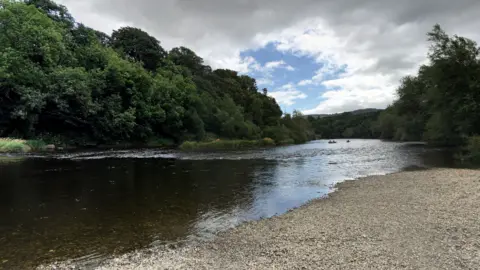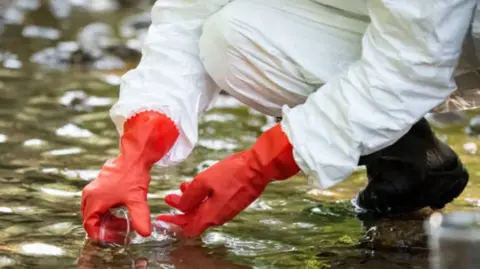River site first in Wales to get swim water status
By Steffan Messenger, BBC Wales environment correspondent

 Google Maps
Google Maps
A section of the River Wye popular with wild-swimmers is to be granted official bathing water status in a Welsh government U-turn.
Campaigners said they were “delighted” by the move, which will lead to mandatory monitoring of water quality at The Warren near Hay-on-Wye.
Their application had initially been turned down, over concerns that “increased footfall” at the site might cause environmental damage.
But the Welsh government has now conceded that the stretch of river meets the criteria for bathing water status as it is used by large numbers of swimmers.
Climate Change Secretary Huw Irranca-Davies urged the public to “help ensure that the Site of Special Scientific Interest’s (SSSI) habitats and features remain healthy and managed appropriately for future generations.”
This will be the first stretch of river in Wales to be designated for its bathing water.
It means the environmental regulator Natural Resources Wales (NRW) has to test the water quality regularly during bathing season – from May to the end of September – and take steps to address any issues.
The local council would also have to display information to let swimmers know about the state of the water and any pollution incidents.

 Getty
Getty
Writer and journalist Oliver Bullough, part of the Friends of the River Wye campaign group, had spearheaded efforts to secure the designation from Welsh government.
“The motivation is not to encourage more people to swim, lots of people swim there already,” he explained.
“The River Wye has seen a sharp decline in water quality owing to pollution, particularly from agriculture but also from sewage over the last 20 or so years,” he said.
“Governments on both sides of the border have failed to do their duty in protecting the river and by applying for bathing status we can oblige them to test the water quality and take steps to improve it if it’s inadequate.”
“It’s the only tool we have to do that so I’m delighted that we have managed to persuade the government in Cardiff to change their mind – they have now come to the right decision,” he said.
Mr Bullough hoped the site would be “the first of many” in Wales.
“I hope it will be seen as a real first step in a long journey to clean up our rivers.”


Volunteers from the Friends of the River Wye had regularly visited The Warren over the summer of 2022 to record how many people were using the river.
Their findings included a day in July where there were 150 people on the beach, 32 swimming, eight canoeing and six paddling.
But their application for bathing water status was initially rejected, with the Welsh government citing opposition from NRW, Hay Town Council and the Hay Warren Trust over the potential impact of increased visitors on the local environment and wildlife.
Campaigners said this presented them with a “absurd, catch 22” situation, having to prove the river was being used to be granted extra protections, while being told that using the river could lead to further damage.
Mr Irranca-Davies said his “aim in taking the original decision was to support environmental protections at a river already facing so many challenges”.
“Although I am disappointed that the decision was contested and the Friends of the River Wye requested that I reconsider, this outcome will not deter our commitment to protecting and enhancing Wales’ natural environment,” he added.
The decision does not remove a requirement for the landowner to obtain NRW’s consent for permitting bathing at The Warren, he said.
“In considering any application for consent NRW would need to assess the potential impact to ensure it does not harm the important habitats and species that the area is designated to protect.”
Despite the “significant concerns and objections” raised, the application did meet “the sole criterion for designation under the regulations, namely there is evidence of bather numbers”, he said.
“Consequently, I have taken the decision to designate The Warren as a bathing water”.
Natalie Hall of Natural Resources Wales said it supported the Welsh government’s “ambition to designate more inland bathing waters and improve bathing water quality monitoring”.
“We understand why the decision to designate The Warren as a bathing water was taken, but we remain concerned that it may increase public use of the site and damage the sensitive features and species.”
She said NRW will “continue to assess” its approach to inland bathing waters and “will begin to develop a monitoring programme for The Warren”.








